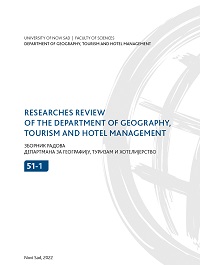PERCEPTIONS AROUND CLIMATE CHANGE IMPACTS ON NATURAL RESOURCES AND TOURISM SUSTAINABILITY IN PROTECTED AREAS: A CASE STUDY OF MAASAI MARA NATIONAL RESERVE, KENYA
PERCEPTIONS AROUND CLIMATE CHANGE IMPACTS ON NATURAL RESOURCES AND TOURISM SUSTAINABILITY IN PROTECTED AREAS: A CASE STUDY OF MAASAI MARA
NATIONAL RESERVE, KENYA
Author(s): Rotich LabanSubject(s): Economy, Geography, Regional studies, Regional Geography, Environmental Geography, Tourism
Published by: Prirodno-matematički fakultet, Univerzitet u Novom Sadu
Keywords: Host Perceptions; Climate Change; Wildlife; Tourism Sustainability
Summary/Abstract: Kenya’ tourism industry is predominantly based on nature and founded on protected areas (PAs) model. However, climatic changes through unstable temperature as well as rainfall patterns have the potential to causedeclines in wildlife populations in these PAs. Climate change poses exceptional social, cultural as well as environmental challenges. In Kenya’s Maasai Mara National Reserve (MMNR), a combined number of factorsincluding climate change, human population pressure on wildlife dispersal areas including human wildlife conflict has resulted in catastrophic declines in wildlife populations. The study investigated MMNR host community perceptions oaround climate change impacts of on natural resources and sustainability of tourism. This isbecause regional knowledge gaps exist in research on climate change impacts on tourism. Exploratory researchdesign was adopted. This research used quantitative data and hence exploratory approach was considered suitable. Simple random sampling was adopted to sample 399 heads of households who filled the questionnaires.Using SPSS V.23, descriptive as well as inferential statistics was adopted to analyze quantitative data. The relationship between the variables was determined using linear regression. The study findings indicate a positive aswell as significant relationship on the two variables of natural resources and tourism sustainability as evidencedby the values (β=0.393 and p=0.000). Also, the coefficient of determination (R squared) shows 39.5% variationin sustainability of tourism can be attributed to climate change as indicated in Table 3. The study findings raisesthe need for strategic initiatives and considerations for developing alternative wildlife based tourism productsin the advent of declines in wildlife populations as a result of erratic rainfall and temperature patterns.
Journal: Zbornik radova Departmana za geografiju, turizam i hotelijerstvo
- Issue Year: 51/2022
- Issue No: 1
- Page Range: 11-24
- Page Count: 13
- Language: English

